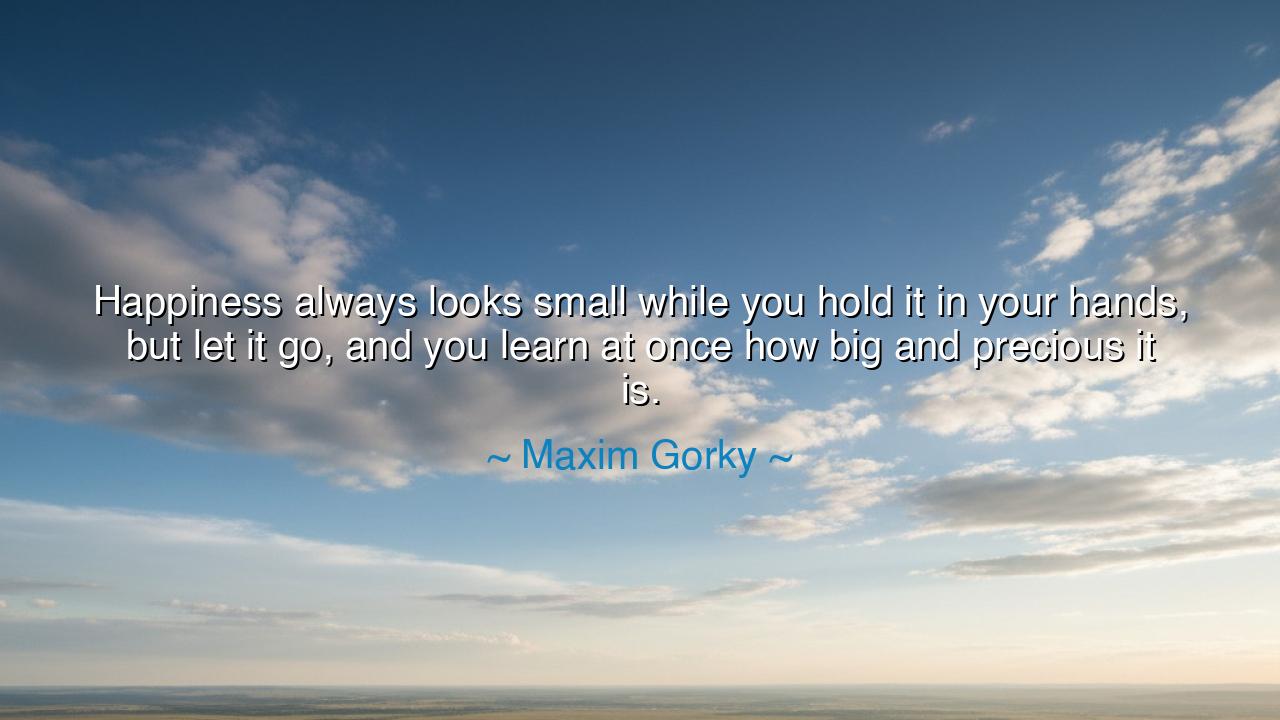
Happiness always looks small while you hold it in your hands, but
Happiness always looks small while you hold it in your hands, but let it go, and you learn at once how big and precious it is.






Maxim Gorky, the voice of the Russian soul and the poet of human struggle, once wrote: “Happiness always looks small while you hold it in your hands, but let it go, and you learn at once how big and precious it is.” In these words lies the bittersweet truth of human nature — that we often fail to recognize the value of what we already possess until it slips beyond our reach. Gorky, whose life was marked by hardship and exile, understood the fragility of joy more deeply than most. To him, happiness was not a grand or constant flame, but a delicate light that must be tended carefully — for only when it fades do we see how it once illuminated our world.
The origin of this thought can be traced to Gorky’s own life, one forged in poverty and struggle. Born into misery, he rose through the force of will and imagination, becoming one of Russia’s greatest writers and humanists. He had known love and lost it, found hope and watched it crumble, embraced ideals only to see them betrayed. And so, from a life of fleeting joys and lingering regrets, he spoke this truth: that we are blind to happiness while we possess it, because the human heart is ever restless, ever searching for something beyond what is before it. It is only when joy departs — when the familiar becomes memory — that its true measure is revealed.
This is a lesson as old as humanity itself. The ancients spoke of ingratitude as one of the great errors of the soul. We walk amid blessings — friendship, love, health, the quiet safety of ordinary days — and treat them as the air we breathe: unnoticed until it is gone. Gorky’s words awaken us to the sacredness of the everyday, to the truth that happiness is not small — our awareness is. When our hearts are consumed by longing for more, the gifts already in our grasp appear trivial. But when those gifts vanish, the emptiness they leave behind shows us their true weight.
Consider the tale of King Midas, who, blinded by greed, wished that all he touched would turn to gold. When his wish was granted, the joy he expected turned to horror, for even his food, his drink, and his beloved daughter became lifeless metal. Only then did he understand that what he had once taken for granted — a meal, a touch, a smile — was more precious than all the treasures of the world. So it is with all of us. We measure happiness by grandeur, yet its greatest forms are often the smallest: the warmth of a hand, the sound of laughter, the peace of a shared silence.
Gorky’s wisdom also reveals something more profound — that happiness lives in the present, and its magic fades when the mind drifts to past or future. The man who looks too far ahead misses the beauty of now. The woman who mourns what has passed blinds herself to what remains. To “hold happiness in your hands” is to live consciously, to recognize each moment as a gift. But to let it slip unnoticed is to join the countless souls who only realize its worth when it is gone. This is why Gorky calls happiness “precious” — not because it is rare, but because it is fragile, easily broken by neglect or distraction.
And yet, even in loss, there is a hidden grace. When happiness departs, it leaves behind a kind of wisdom — the wisdom of gratitude. We learn, through absence, what presence truly meant. The heart that mourns is also a heart that has loved; the eyes that weep are eyes that once saw beauty. Gorky teaches that loss is the mirror of appreciation — that in remembering what we have lost, we are called to cherish more deeply what we still possess.
So, my listener, take this teaching to heart: do not wait until joy is gone to honor it. Look closely at your life — at the people who love you, the breath in your lungs, the morning light upon your face — and understand that you are holding treasures too vast to measure. Do not dismiss them as small; they are the very fabric of meaning. Practice gratitude daily; pause in your haste and give thanks for what is already yours. For one day, as Gorky warns, time will open your hands, and you will see that what you thought was small was, in truth, the immensity of happiness itself — the quiet grandeur of a life once whole, and deeply blessed.






AAdministratorAdministrator
Welcome, honored guests. Please leave a comment, we will respond soon